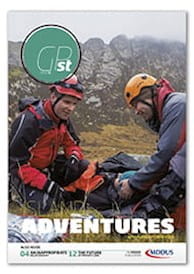RESPIRATORY conditions account for more than 24 million GP consultations a year and are one of the UK’s biggest causes of mortality. From asthma and pneumonia to tuberculosis and chronic obstructive pulmonary disease (COPD), the range is broad, encompassing both acute and chronic conditions. Other major diseases include cystic fibrosis, lung cancer and sleep apnoea.
Respiratory disease kills one in four people in the UK – even more than heart disease – which is twice the EU average. By 2020, chronic respiratory disease is expected to rank as the fifth leading cause of morbidity.
GPs are at the frontline of care in this field, with respiratory conditions the most common reason for general practice consultation (or emergency medical admission to hospital). Clinicians with an interest in this area are well placed to bring specialist services closer to patients’ homes and to help them better manage their conditions.
Entry and training
Training for GPs looking to develop a special interest in respiratory medicine can be gained in a number of ways and should include both practical and theoretical elements. This can vary from work experience and attendance at relevant meetings or lectures, to self-directed learning or recognised university courses.
There is also the option of completing a diploma in primary care respiratory care. One such course is available at the University of Bradford and takes 18 months to complete, combining taught modules and work-based learning.
Assessment for GPwSIs also takes various forms, including case note review, mini clinical examination, logbook and direct observation by a specialist clinician.
The RCGP has a framework setting out the competences required for respiratory GPwSIs, which include:
• Asthma
• Drug therapy for respiratory disease
• Health promotion and prevention
• Respiratory infection
• Allergic disease of the respiratory tract
• Chronic obstructive pulmonary disease (COPD)
• Acute respiratory disease
• Other respiratory disease.
The Primary Care Respiratory Society (PCRS) offers its members advice and training, highlighting best practice in a range of guidance, research and news publications. There are also useful guidelines and resources on the British Thoracic Society website.
The job
The role of a GPwSI in respiratory medicine straddles both primary and secondary care settings. Often GPs will provide care for patients within their normal practice, as well as in a dedicated respiratory clinic (usually alongside a more specialist practitioner), or within a respiratory care specialist service.
Their skills will be used to assess, diagnose and manage patients with defined respiratory problems, for example helping to diagnose and manage care for patients with chronic conditions such as asthma, COPD and allergic disease. GPwSIs should also be able to diagnose and manage acute presentations, such as breathlessness in both children and adults, referring where necessary. The RCGP lists examples of clinical services that a GPwSI could deliver, including:
- Consultation with patients referred by other practitioners for advice on diagnosis and clinical management for defined respiratory problems
- Diagnosis, e.g. spirometry, skin prick testing
- Disease assessment, e.g. oxygen assessment in COPD
- Pharmacological management
- Non-pharmacological management, e.g. pulmonary rehabilitation in the management of COPD and immunotherapy in the treatment of allergy.
GPwSIs are well placed to offer expertise in prevention, detection and treatment in respiratory care for patients, health professionals and healthcare managers. They may also choose to provide leadership support for the development and implementation of local respiratory services and guidelines.
Whatever responsibilities doctors assume, it is clear that respiratory medicine is an interesting and varied field, and one in which demand for GP skills looks set to increase considerably in the coming years.
Sources/links:
- The Primary Care Respiratory Society
- The Burden of Lung Disease, British Thoracic Society
- Framework for GPs with a special interest in respiratory medicine
Joanne Curran is an associate editor at MDDUS
 Q&A - Dr Steve Holmes, GP with an interest in respiratory medicine
Q&A - Dr Steve Holmes, GP with an interest in respiratory medicine
What attracted you to a career as a GPwSI in respiratory medicine?
First and foremost my career has been focused on being a good family doctor/ generalist clinician. The interest in respiratory medicine came after I attended the Primary Care Respiratory Society UK annual conference. The group were enthusiastic and engaging and over several years I have become more involved in respiratory care.
What do you enjoy most about the job?
The job is ongoing, continually changing and involves clinician education, working with charities, patient/professional groups, contributing to guideline development, and influencing senior NHS colleagues and politicians.
Are there any downsides?
My specialist interest involves working with a variety of organisations and supporting my CCG as clinical respiratory lead. I can help change things on a bigger scale through education and policy/ guidance. But as a downside, at times we are slow in the NHS to change. Unfortunately, nearly all my specialist colleagues are still writing in records – the secondary care sector has failed to embrace technology and use it to patient benefit.
What do you find most challenging?
There are challenges with trying to find resources, trying to change systems, trying to improve standards – but when there is success the buzz is palpable, and it is possible to see how things have improved in the longer term in many areas. What about the role has most surprised you? Most surprising has been the passion from many generalists, nurses, specialist doctors, physiotherapists, and pharmacists to want to make a difference. It is a struggle at times in the NHS but the vast majority of us are trying to improve quality of care.
What is your most memorable experience so far?
I had a patient with severe COPD in her mid-50s. With encouragement she lost two stone, stopped smoking and went from walking 800 yards maximally to walking up Snowdon within around 10 months. She brought me a picture of her at the summit and said she felt so good she walked down rather than catching the train as planned. “I feel better than I have for years, doc” is a significant experience every time it happens.
What advice would you give to a trainee GP considering a career as a GPwSI respiratory medicine?
Enjoy your role as a generalist. Join the Primary Care Respiratory Society UK – go to the conference and get involved. And do enjoyable things that help keep you up-to-date and fit in with your other commitments.
This page was correct at the time of publication. Any guidance is intended as general guidance for members only. If you are a member and need specific advice relating to your own circumstances, please contact one of our advisers.
Read more from this issue of Insight Primary

Save this article
Save this article to a list of favourite articles which members can access in their account.
Save to library

